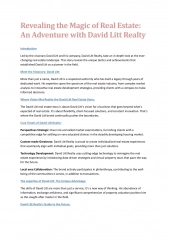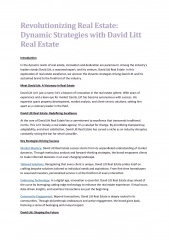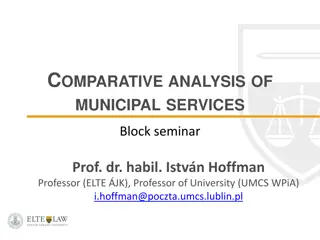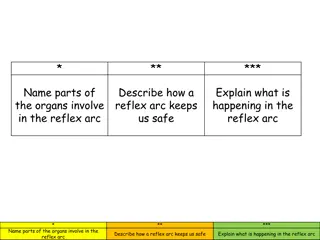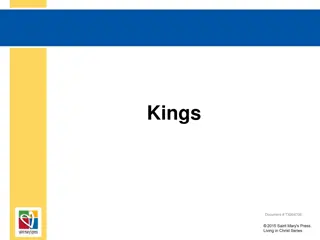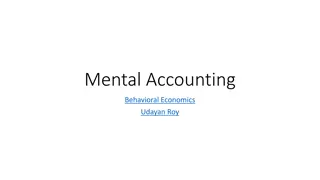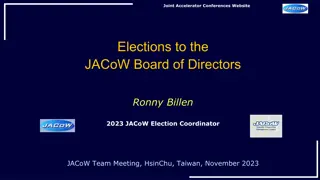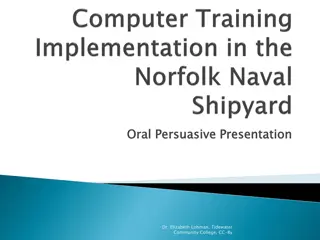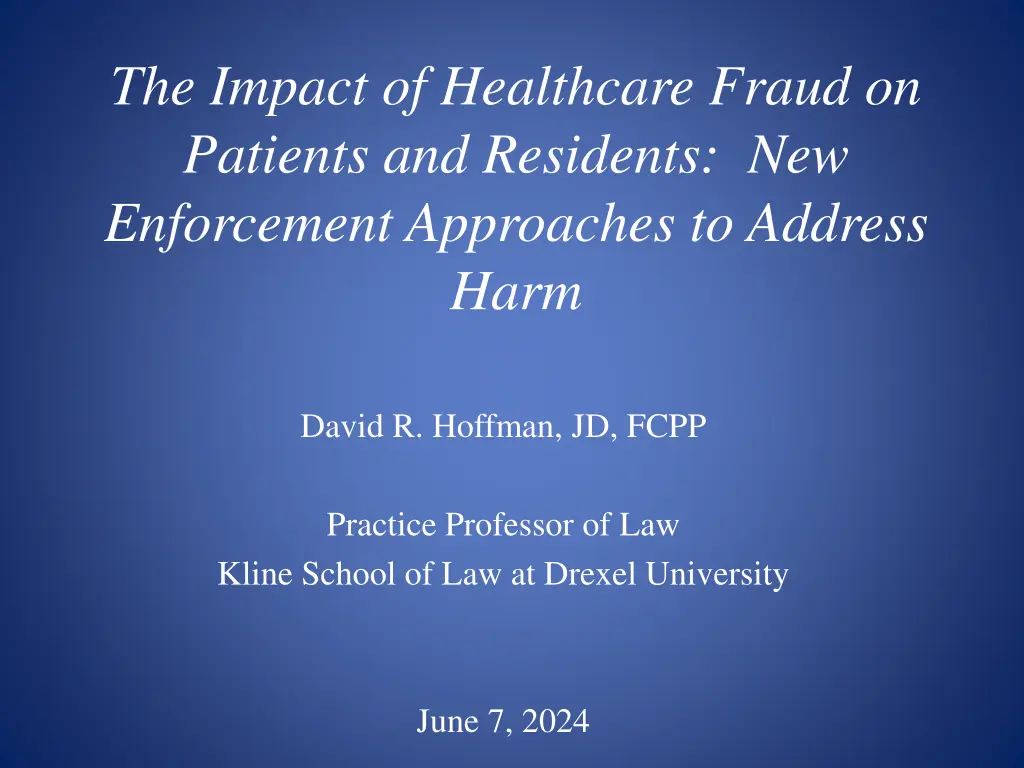
Impact of Healthcare Fraud on Patients and Residents: New Enforcement Approaches
Explore the consequences of healthcare fraud on patients and residents, along with new enforcement strategies to address harm. Learn about key legal provisions such as the Federal False Claims Act and recent cases filed in Philadelphia and New York. Discover the allegations against AHF and the multiple cases filed in different counties, shedding light on the importance of combating healthcare fraud for the well-being of individuals in care facilities.
Download Presentation

Please find below an Image/Link to download the presentation.
The content on the website is provided AS IS for your information and personal use only. It may not be sold, licensed, or shared on other websites without obtaining consent from the author. If you encounter any issues during the download, it is possible that the publisher has removed the file from their server.
You are allowed to download the files provided on this website for personal or commercial use, subject to the condition that they are used lawfully. All files are the property of their respective owners.
The content on the website is provided AS IS for your information and personal use only. It may not be sold, licensed, or shared on other websites without obtaining consent from the author.
E N D
Presentation Transcript
The Impact of Healthcare Fraud on Patients and Residents: New Enforcement Approaches to Address Harm David R. Hoffman, JD, FCPP Practice Professor of Law Kline School of Law at Drexel University June 7, 2024
Federal False Claims Act Under the False Claims Act (FCA), any person who: Knowingly presents, or causes to be presented, a false or fraudulent claim for payment or approval; or Knowingly makes, uses, or causes to be made or used, a false record or statement material to a false or fraudulent claim; conspires to commit either of the above; is liable for treble damages and monetary penalties per false claim. 31 U.S.C. 3729
Allegations Against AHF Government alleged that residents at 3 SNFs in a chain: did not receive adequate medical, dental or psychiatric treatment; Were not properly fed; were not cleaned or changed and were left to sit in their own urine; were overmedicated, and suffered from an abnormally high rate of pressure ulcers and falls Buildings were dirty, unsafe, pest-infected Infection control was lacking Two residents died, one hung himself and another pulled out her own breathing tube
New York Executive Law 63(12): Whenever any person shall engage in repeated fraudulent or illegal acts or otherwise demonstrate persistent fraud or illegality in the carrying on, conducting or transaction of business, the attorney general may apply, in the name of the people of the state of New York, to the supreme court of the state of New York for an order enjoining the continuance of such business activity or of any fraudulent or illegal acts, directing restitution and damages...
Multiple Cases Filed November 29, 2022: Orleans County: Villages of Orleans, a for-profit 120-bed nursing home; December 13, 2022: Nassau County: Fulton Commons, a for-profit 280-bed nursing home, in East Meadow; December 15, 2022: Nassau County: Spring Hills, a for-profit 588-bed nursing home in Oyster Bay The Cold STAFFING
Nursing Home Ownership: ACCOUNTABILITY Fiduciary Relationship special obligation Aiding and abetting breach of fiduciary duty Breach of fiduciary duty Knowledge of breach Substantial assistance or encouragement by the aider and abettor in effecting that breach Stetts v. Manor Care of Williamsport PA (North) et al., Pa. No. 16-0983 (C.P. Lycoming December 30, 2021) Due Diligence: What was known about care issues? Prior surveys and plans of correction (POCs) Compliance hotline calls/contacts Family complaints/lawsuits Promises made in POCs not kept
Fraud Enforcement Actions Against Private Equity United States ex rel. Martino-Fleming, v. South Bay Mental Health Ctr., Inc.--$25 million settlement United States ex rel. Medrano v. Diabetic Care RX,LLC, case against a PE firm for its involvement in its portfolio s conduct(No. 15-cv-62617- BLOOM/Valle, 2019 WL 1054125 (S.D. Fla. Mar. 6, 2019)--$21 million United States ex rel. Anderson v. Curo Health Servs. Holdings, 3:13-cv-00672 (Lead) (M.D. Tenn. Mar. 21, 2022) in litigation
Successful Prosecution U.S. ex rel. Martino-Fleming litigated through MTDs and summary judgment. SB was a chain of mental health centers founded in 1986 by Peter J. Scanlon, who served as CEO until 2012. It was staffed primarily by unlicensed social workers and mental health counselors. Over 90% of SB s revenue was from MassHealth, the MA Medicaid program. Scanlon sold SB to C.I.S. in 2012. (C.I.S. was established by H.I.G. in 2012 to acquire SB; Kevin Sheehan was a minority owner.) U.S. declined; Commonwealth of Massachusetts intervened.
Theories of Liability U.S. ex rel. Martino-Fleming Scienter: did H.I.G. know that SB was noncompliant with MassHealth regulations concerning licensure and supervision? Causation: did H.I.G. caused SB to submit false claims to MassHealth?
Scienter U.S. ex rel. Martino-Fleming order on cross MSJs, 540 F. Supp. 3d 103 (D. Mass. 2021): Scienter reckless disregard satisfied as to H.I.G. with evidence that H.I.G. s leadership understood that SB s revenues tied to Medicaid, which had terms and conditions of payment; H.I.G. s members were aware that Medicaid required certain kinds of supervision in terms of licensure and qualifications, and were told as much by SB personnel; H.I.G. members told that SB clinicians had inadequate supervision, including via SB/CIS CCO and Relator reports to H.I.G, Tiger Teams recommendations to hire licensed supervisors.
Causation U.S. ex rel. Martino-Fleming order on cross MSJs, 540 F. Supp. 3d 103 (D. Mass. 2021): Causation knowing ratification of prior policy of submitting false claims established with evidence that H.I.G. s members received reports showing recommendations to bring SB into compliance with regulations were not implemented H.I.G s members had power to fix regulatory violations by virtue of sitting on CIS board, but failed to.
Role of Monitors Brief history Evaluate care delivery Resident outcomes Care delivery processes Policies and procedures Staffing--number and competency Identify systemic vulnerabilities in care and compliance and propose remedial actions not a gotcha program
Goals of Monitoring (1) Increased quality care delivery as measured by improved resident outcomes and enhanced resident safety; (2) Systems improvements to identify risk before resident harm occurs policy/procedure review and modifications; (3) Meaningful clinical interventions to achieve compliance through person-centered care (assessment/care planning); (4) Effective ethics and compliance program; (5) Robust Quality Assurance Performance Improvement Program (QAPI); (6) Confidence that facility can identify compliance-related problems and solve them in a collaborative fashion.
Reports Findings and Recommendations Submitted to both parties simultaneously Opportunity for facility to respond to report Follow-up discussion Corrective Action Plan developed
Metrics for Success Better state survey results Effective internal event reporting and investigation system Reputation in community improves (long-term care ombudsman program, families, professionals ) Stable leadership and competent staff Good communication amongst staff across all shifts Improved Quality Metrics Use of psychotropic medications decreases Falls decrease In-house acquired wounds decrease Readmissions to hospital decrease Quality of life (as expressed by residents) enhanced Activities Meal experience
Final Thoughts Every health care fraud investigation should include an effectiveness review of the organization s ethics and compliance program If the compliance program is not effective , high level personnel should be held personally accountable for this failure and be subject to personal liability Settlements that could impact patient/resident safety (health care providers globally) should require monitoring by a third party regardless of whether patient harm has been demonstrated

